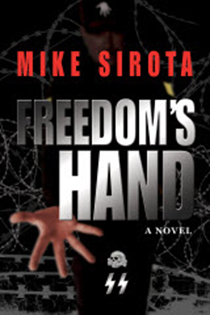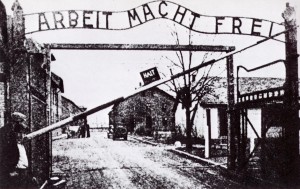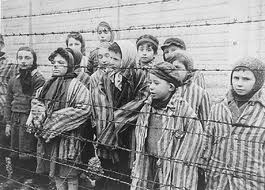 I began writing the bare bones of Freedom’s Hand many years ago and ultimately published it in 2013. My storyline was that, five decades after the liberation of the European concentration camps, a white supremacist called The Commander would use his vast wealth to replicate Auschwitz in the desert of the American Southwest and “collect” all minorities with the intention of destroying them. The political climate being what it is, white supremacists and other haters have been coming out of the closet like never before. This includes—according to the current administration—some “very fine people.” Scary…
I began writing the bare bones of Freedom’s Hand many years ago and ultimately published it in 2013. My storyline was that, five decades after the liberation of the European concentration camps, a white supremacist called The Commander would use his vast wealth to replicate Auschwitz in the desert of the American Southwest and “collect” all minorities with the intention of destroying them. The political climate being what it is, white supremacists and other haters have been coming out of the closet like never before. This includes—according to the current administration—some “very fine people.” Scary…
Here is the prologue to Freedom’s Hand. It introduces Nathan Adler who, many years later, will unwillingly relive the nightmare of his youth.
PROLOGUE: LATE AUTUMN, 1943
The locomotive, belching foul smoke, pulled a train of mostly cattle cars across the dismal Polish landscape.
Inside one of the cars, Nathan Adler grimaced when the bony elbow of a teenaged boy jabbed him in the back. The boy, a couple of years younger than Nathan, had shifted his position again. This one needs more patience, Nathan thought, more consideration. Old Mr. Tauber had not fidgeted so!
But Mr. Tauber had been ill before their whole town was loaded onto the train and had not survived the first twenty-four hours. The body would have remained there throughout the journey, had the SS soldiers not dragged it off when they opened the doors to take money and watches.
Cattle car. A place for confining cattle, not human bodies and souls. But eighty or so bodies and souls were inside, occupying a space that would make fifty uncomfortable.
The boy continued to twist. Nathan thought of saying something, then changed his mind. What did it matter anyhow? Complaining voices were ignored here. As long as the boy did not trouble Mama and Miriam, as long as he could remain between them, Nathan would endure the discomfort.

Auschwitz gate: “Work sets you free.”
Hanna and Miriam Adler slept, for the moment oblivious to the heaving mass around them. Nathan glanced at his sister, nearly four years old: Mama’s goldene maidel. Nestled in her mother’s arms, the golden girl looked peaceful. She had cried at the beginning, like most of the children. But now, at dusk on the third day, it was quiet in the car.
Anxiety shadowed Hanna Adler’s face. She had fought sleep all along, afraid that by giving in she would not be able to protect her children. Nathan had chided her for this; after all, had he not been the man of the family since Papa’s death two years ago? But finally, she had given in to the exhaustion.
Where were they going? Mr. Frankel—old learned Frankel—had an answer: an arbeitslager, a labor camp. A place to toil for the new god-devils and their Third Reich until this trouble was over, and they could go back to their homes.
But Nathan thought otherwise. He had heard…stories. Others in the town had heard them too. By choice, they told no one else.
Soon, in darkness, the blur of white and red lights along the track told of the approach to a station. The train slowed. Nathan sat up, jostling the boy, who muttered curses. Ignoring him, Nathan peered through cracks in the timbers at the variegated glow, which was soon distinguishable as individual lamps on poles. Wheels clattered; steam escaped. A dark unease gripped Nathan as the brakes squealed. The transport shuddered to a halt before brighter lights, and milling people.
Journey’s end. Most were already rising to their feet and rummaging for belongings on the floor of the car. Nathan gently shook Mama and Miriam as the doors were flung open.
“Heraus! Alles heraus! Los!”
“Schnell, Judische schwein! Mach schnell!”
 The words pierced like the bite of a rabid dog. Soldiers dragged people from the car. Mama and Miriam, now rigidly awake, stood with Nathan, who held tightly to an old suitcase they had managed to fill. Waiting reluctantly, they watched as a dozen men clambered into the car: emaciated things with dark, sunken eyes, dressed in poorly-fitting clothes resembling striped pajamas. Wooden shoes drummed on the floorboards as, under the relentless urging of German overseers, they shoved the confused passengers toward the opening. The Adlers were caught in a wave that carried them to the edge.
The words pierced like the bite of a rabid dog. Soldiers dragged people from the car. Mama and Miriam, now rigidly awake, stood with Nathan, who held tightly to an old suitcase they had managed to fill. Waiting reluctantly, they watched as a dozen men clambered into the car: emaciated things with dark, sunken eyes, dressed in poorly-fitting clothes resembling striped pajamas. Wooden shoes drummed on the floorboards as, under the relentless urging of German overseers, they shoved the confused passengers toward the opening. The Adlers were caught in a wave that carried them to the edge.
“Heraus! Schnell!” The words pummeled the senses. Nathan leaped to the platform. Putting down the suitcase, he turned to assist his mother and sister. When they again stood together, the suitcase—all that had been left of their world—was gone.
Amid the frenetic activity surrounding him, Nathan noticed the station sign over the platform: AUSCHWITZ.
The Adlers were thrust into a ragged column. Up and down the platform, those who had already stood before their captors were being formed into longer, more orderly lines. One consisted of men; a second—smaller—of young women; the third and largest of the elderly, those in poor health…and children. Nathan’s earlier uneasiness now strangled him.
Bright lights from a nearby arbeitslager lit the road that many followed toward manned watchtowers and high fences strung with barbed wire. The Adlers were confronted by a tall, smiling officer in SS gray. All along he had seemed less cruel than the others. He studied the tall, athletic Nathan carefully, often nodding.
“Kraftig,” he said in approval. “Gut, gut.”
Hanna Adler stood stiffly as the officer faced her. Removing a glove, he touched her cheek. The hell of recent days could not diminish her comeliness. He was smiling when he lifted her long, tattered dress, but the smile faded when he saw her left leg, deformed from birth. He tapped the metal brace that had long encased it with his walking stick then turned away disgustedly.
Until then, Nathan had refused to believe that what was happening to others could happen to them. Ignoring the tiny Miriam, who clung to her mother’s dress, the officer motioned for two soldiers. One grabbed Hanna’s arm, hurting her, and dragged her toward the long column of those with no future.
“Mama!” Nathan cried. “No, don’t take her—!”
He had gone only a step when other soldiers grabbed him. At first struggling, he was quickly subdued by a blow from the handle of the officer’s stick on the side of the head. Buckling, he couldn’t focus on Mama or Miriam, now at the end of the column and under the cold eye of a scowling SS woman.
“Miriam!” Hanna screamed. “Nathan, please!”
The girl, torn loose, had fallen. “Mama! Mama!” she sobbed.
“Sei still, Judische hund!” the woman snapped.
Hanna Adler was pulled from the column and forced to her knees. With barbaric cruelty the woman drove a heavy boot into her stomach. Gasping, she doubled over.
Miriam began to crawl, then rose to her feet. Blinded by tears she staggered aimlessly, her arms held out. The soldiers were amused.
“Nathan?” the child cried. “Nathan!”
“Miriam?” Nathan could see her now; Mama, too. “In the name of God—!”
Snarling German shepherd dogs, straining against their leashes, had kept the prisoners moving. As Miriam wandered too near some of them, one creature pulled free. The handler made no attempt to retrieve the dog. Its weight crushed the child before its jaws found her throat. Blood spattered the gray dust as it shook the limp body like a rag doll.
More blows fell on Nathan. They would not think of destroying him; a sturdy prisoner was valuable in an arbeitslager. Unable to will away the darkness, he did not see as two others from their train, under stinging orders, lifted Mama and rejoined the column on its march to oblivion.
Brutal, yes? But that is the way it happened during the Holocaust. As I said at the start, let’s hope it never comes to this.
I’ve put the award-winning Freedom’s Hand on a Kindle Countdown Deal for three days, October 10th-12th, at $2.99 (regularly $5.99). If you read it, I would appreciate your input.
